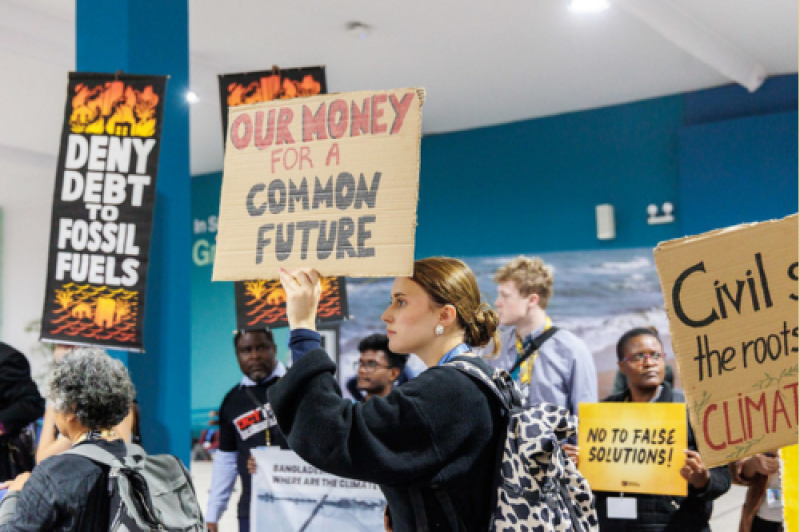- Tarique visits National Martyrs’ Memorial, pays homage to martyrs |
- Muslim League leads new electoral alliance, Jatiya Muslim Jote |
- Tk 500cr Drive to Turn Haor Fallow Land Into Farmland |
- Tarique Rahman returns home amid rapturous reception |
- Home After 17 Years: Tarique Returns to Gulshan Residence |
US$1 tn climate finance target remains elusive: Transparency

Activists protesting against fossil fuels at the COP29 venue in Baku. Photo- Habib Samadov-UN Climate Change
As COP29 comes to an end in Baku, Azerbaijan, negotiators are trying to agree on the next international climate finance goal (or New Collective Quantified Goal). Although a final agreement may take more time, it’s highly unlikely leaders will approve the US$1 trillion climate finance target being demanded by science.
The lack of concrete targets is just one issue. We're concerned anti-corruption was absent from the COP29 agenda, with it treated as a silo issue that can be solved without a high-level commitment. Even if leaders back the EU’s US$200–$300 billion target, no new transparency requirements were agreed to better manage climate finance.
While new carbon credit rules were approved in Baku, they were rushed through on day one, without enough time for due scrutiny – the corruption risks explored in our 2022 report on geoengineering still stand more than two years later.
In the discussions under the Just Transition Work Programme, a key contentious issue has been the access to quality finance for a just transition and the responsibilities of developed countries to pay for it. While the draft text acknowledges the importance of access to finance, some developing countries have argued that it lacks precision, making it hard to implement and hold parties accountable.
Unfortunately, Azerbaijani political elites, oil and gas companies, and lobbyists have used COP29 to promote a pro-fossil fuel agenda. Thousands of fossil fuel, carbon capture and agriculture industry lobbyists attended the conference. Transparency International data shows that almost 50 per cent of participants (26,113 people) either failed to disclose their relationship with their COP nominator or registered under vague labels like “guest” or “other”. This means we do not know the true business or personal interests of half of COP attendees, despite their access to sensitive diplomatic discussions.
This delays meaningful climate progress. As Mary Robinson, former UN Special Envoy for Climate Change, said this week: “It does make a difference when you have powerful members of a lobby in every room that negotiations are happening in… It slows things down. It weakens language, and we’re seeing that.”
Climate finance also took centre stage at this week’s G20 summit in Rio de Janeiro, Brazil, with UN Secretary General António Guterres urging the biggest economies and emitters to "lead by example." Guess what was missing in these discussions? Robust anti-corruption measures. We warned that without addressing this issue, agreements will remain only aspirational.
To protest, forty-eight hours before the G20 Leaders’ Summit in Rio de Janeiro, Transparency International filled the city’s sky with giant dollar bills to call attention to the G20’s failure to address corruption. Six paragliders with canopies customised with US$100-bill designs flew over Rio, touching down on a banner which read: “How obvious should corruption be before it’s a G20 priority?”
Unfortunately, this year, it still wasn’t obvious enough to leaders. In the Leader's Declaration released on Monday night, a single, cursory paragraph was devoted to anti-corruption, using weaker-than-ever language on actual actions. While leaders do appear to have found common ground on multiple critical problems – from progressive taxation to measures to alleviate poverty and promote peace – without addressing corruption and dirty money, agreements made at summits like these will not lead to real change.
Multilateral action is critical to addressing global problems. However, the G20 and COP29 serve as reminders that commitments risk becoming mere aspirational targets when corruption isn’t tackled head-on. As we look to COP30 in Belém, Brazil, there’s hope for a truly transparent approach to climate action. We expect tighter rules around COP30, including stronger criteria for selecting corporate sponsors, robust measures to prevent conflicts of interest and unrestricted civil society participation. We welcome President Lula’s proposed "global ethical stocktake" for COP30, but Brazil can go even further, leading by example in fighting the climate crisis with full transparency and accountability.

